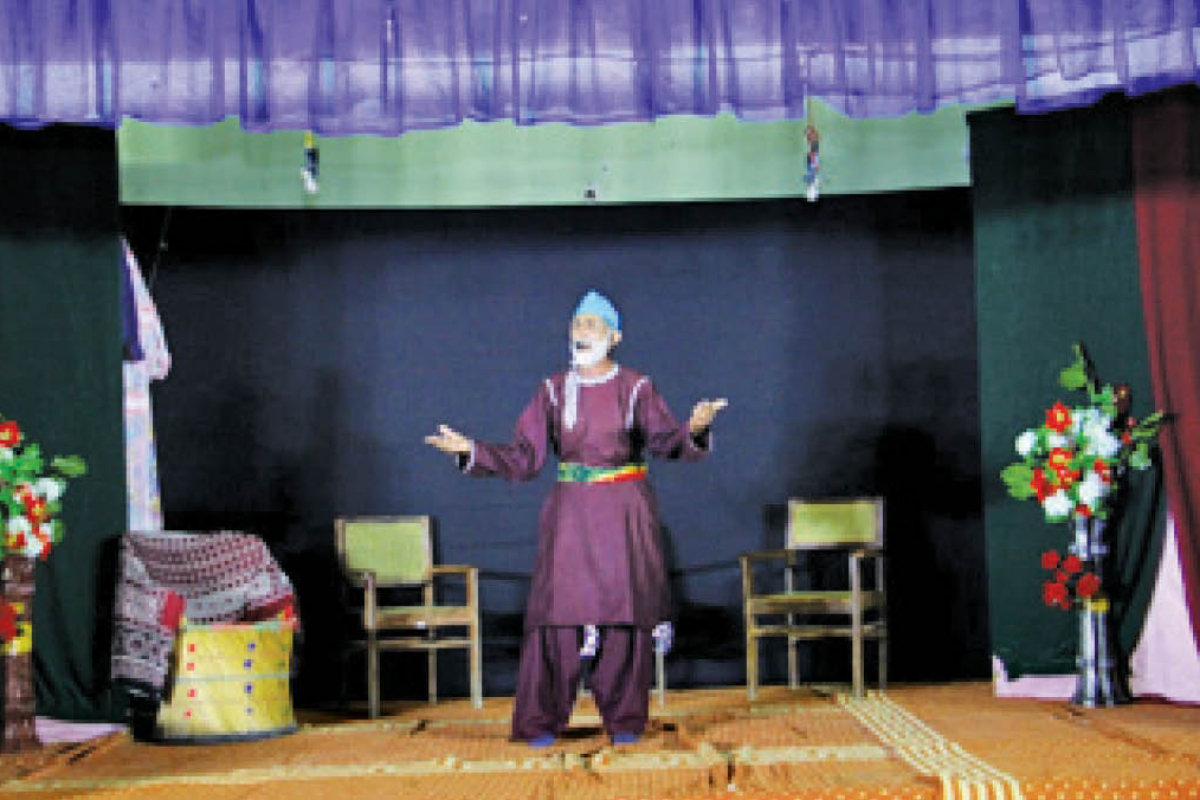
Breath of fresh air
Sindhi stage drama revival starts from Sujawal
Thatta – To mark the revival of stage plays in Sindh, enthusiasts gathered at Shirazi Hall of Sujawal to watch their favourite local artists perform after a long time on a unique subject of unity and interfaith harmony.
The idea was a brainchild of the central bank, the European Union and different NGOs who had approached the Culture Department of Sindh, urging it to play an active role in revitalising the Sindhi stage dramas. The move has infused a new life in the dying trend of stage plays at the provincial level.
Following the need to promote the talent of low-lying areas of Sindh, the National Academy of Performing Arts (NAPA) Karachi, in collaboration with the Pakistan Arts Council and the Sindh Culture Department, presented a mega stage play ‘Janhn diye mein tel kone’ (The earthen lamp without oil) at the Shirazi Hall of Sujawal in the last week of October, attracting droves of theatre buffs from across the district.
The Director of the play, Raffique Essani, who has acted in over 900 stage and television plays, was delighted to see the tremendous response of the public in his native Sujawal district. “My prime objective was to promote the local talent”, said Raffique Essani while talking to this scribe. He further mentioned that NAPA through this initiative, aimed at uplifting the financial status of stage actors who had reeled through a crisis after the diminishing trend of stage plays in the country.
The history of Sindhi stage plays traces its roots to the pre-independence era when the artists used to perform at the chowks (roundabouts) or open grounds to bring people out of their abodes, and also to entertain them at their doorsteps, especially when there were fewer resources and the people did not have easy access to entertainment.
The play, which was written by Lala Gobind Mali, revolved around the importance of unity, interfaith harmony and cultural norms. Besides, it carried the message of honesty and commitment as well. The platform provided a big opportunity for local talent to project their acting skills in front of their people. Well-known Sindhi artists including Urs Narejo, Javed Takani, Khuda Dino Tharani, Gul Mohammad, Nadeem Khatti and Ayesha Mahek played lead roles in the play.

Barkat Ali, an actor who is in his 70s, while recalling the colourful memories said, “Myself, a close friend Anwer and Ghulam Mustafa who now resides in Karachi had formed an art circle in Sujawal that performed historical stage plays to raise funds for our soldiers during the Indo-Pak war of 1965. We also infused the spirit of patriotism among the masses through our work, and our stage play ‘Mujahid-e-Azam’ became an instant hit then as we managed to collect around 50,000 rupees, a huge amount at that time, and handed over to the district commissioner. “We sang national songs as well that were aired from Radio Pakistan during that time”, he added.
Urs Narejo, a local artist said that he had worked on television as well but the stage plays had been the school for him. Nadeem Khatti another popular name in the stage art world, while sharing the hard times he had faced after the trend of stage plays diminished across the province, said the going has been very tough since then. In Larkana, singer-turned-actor Saeed Tunio and Roshan Sheikh have kept this tradition ticking despite multiple hurdles.
Talking about the golden era of stage dramas in Sindh, Essani said that during the decade of 80s and 90s, the Sindhi, Urdu and Punjabi stage plays were at their peak as even the elite class of the society preferred watching stage plays owing to significant content and meaningful storyline.
“From 1985 to 1988, renowned literati of Sindh wrote some memorable stage plays that created mass awareness against feudalism and dictatorship”, Rafique recalled. Yousuf Panhwer, Shoukat Hussain Shoro, Agha Salim, Sheikh Ayaz, Ammar Jalil, Noor-ul-Huda Shah and A Q Junejo improvised the Sindhi plays through their sublime creativity. And likewise other parts of Sindh, Sujawal has its own history of stage plays, Umer Malah, Salam Taheem, Noor-ud-din Nafees, Ghulam Mustafa Hashmani, Anwer Hashmani, Barkat Ali, Asghar Khowaja, Ibrahim Memon and Manan Samejo were among the popular names of stage plays during the golden age of theatre in Sujawal.

According to a well-known historian Dr Rasool Bux Baloch, who has a PhD in Sindhi Drama history, the British officials, after their strong footing on Indian soil, started looking for entertainment and established a Royal Theatre in Karachi back in 1854. The local actors used to perform different plays there portraying the South Asian culture that included folk stories, dances and puppet shows.
Professor Mangram Malkani, Dr Ghulam Ali Allana, Dr Qasim Rajpar and other historians all agree that Mirza Qaleech Baig was the one who had written the maiden Sindhi stage play Laila Majnoo in 1880, becoming the first Sindhi playwright. But the credit for nurturing Sindh dramas goes to Muhammad Usman and Lala Gobind Mali who were also popular playwrights of the pre-independence era.
In the early days, the subjects of Sindhi plays contained folk and religious stories, but as time went by, socio-political issues and cultural conflicts gained considerable space.
Catch all the Urban Insight News, Breaking News Event and Latest News Updates on The BOL News
Download The BOL News App to get the Daily News Update & Live News.












 Read the complete story text.
Read the complete story text. Listen to audio of the story.
Listen to audio of the story.